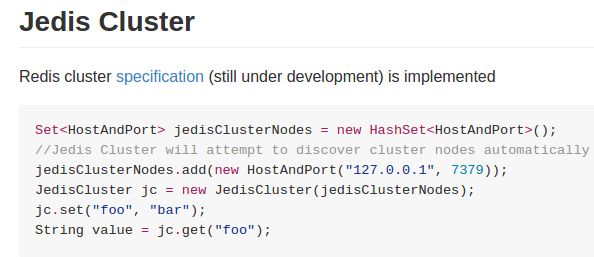redis cluster 基本的redis操作示例:
|
1
2
3
4
5
6
7
8
9
10
11
12
13
14
15
16
17
18
19
20
21
22
23
24
25
26
27
28
29
30
31
32
33
34
35
36
37
38
39
40
41
42
43
44
45
46
47
48
49
50
51
52
53
54
55
56
57
58
59
60
61
62
63
64
65
66
67
68
69
70
71
72
73
74
75
76
|
JedisCluster jc =
null
;
@Before
public
void
before(){
Set<HostAndPort> jedisClusterNodes =
new
HashSet<HostAndPort>();
//Jedis Cluster will attempt to discover cluster nodes automatically
jedisClusterNodes.add(
new
HostAndPort(
"127.0.0.1"
,
7000
));
jc =
new
JedisCluster(jedisClusterNodes);
}
@Test
public
void
test_incr(){
String key =
"page_view"
;
jc.del(key);
jc.incr(key);
String result = jc.get(key);
System.out.println(result);
Assertions.assertThat(result).isEqualTo(
1
+
""
);
}
@Test
public
void
test_setAndGetStringVal(){
String key =
"foo"
;
String value =
"bar"
;
jc.set(key, value);
String result = jc.get(key);
System.out.println(result);
Assertions.assertThat(result).isEqualTo(value);
}
@Test
public
void
test_setAndGetStringVal_and_set_expire()
throws
InterruptedException{
String key =
"hello"
;
String value =
"world"
;
int
seconds =
3
;
jc.setex(key, seconds , value);
String result = jc.get(key);
System.out.println(result);
Assertions.assertThat(result).isEqualTo(value);
Thread.sleep(seconds*
1000
);
result = jc.get(key);
System.out.println(result);
Assertions.assertThat(result).isNull();
}
@Test
public
void
test_setAndGetHashVal(){
String key =
"website"
;
String field=
"google"
;
String value =
"google.com"
;
jc.del(key);
jc.hset(key, field, value);
String result = jc.hget(key, field);
System.out.println(result);
Assertions.assertThat(result).isEqualTo(value);
}
@Test
public
void
test_setAndGetListVal(){
String key =
"mylist"
;
jc.del(key);
String[] vals = {
"a"
,
"b"
,
"c"
};
jc.rpush(key, vals);
List<String> result = jc.lrange(key,
0
, -
1
);
System.out.println(result);
Assertions.assertThat(result).containsExactly(vals);
}
@Test
public
void
test_setAndGetSetVal(){
String key =
"language"
;
jc.del(key);
String[] members = {
"java"
,
"ruby"
,
"python"
};
jc.sadd(key, members);
Set<String> result = jc.smembers(key);
System.out.println(result);
Assertions.assertThat(result).containsOnly(members);
}
|
演示主从切换时的jedis操作情景:
|
1
2
3
4
5
6
7
8
9
10
11
12
13
14
15
16
17
18
19
20
21
22
23
24
25
26
27
28
29
30
31
32
33
34
35
36
37
38
|
JedisCluster jc =
null
;
@Before
public
void
before(){
Set<HostAndPort> jedisClusterNodes =
new
HashSet<HostAndPort>();
//Jedis Cluster will attempt to discover cluster nodes automatically
jedisClusterNodes.add(
new
HostAndPort(
"127.0.0.1"
,
7000
));
jc =
new
JedisCluster(jedisClusterNodes);
}
/**
* 在一个无限循环中不停的读写
* @throws InterruptedException
*/
@Test
public
void
setAndWriteStringValueRepeatedly()
throws
InterruptedException{
String key =
"test_oper_during_failover"
;
jc.del(key);
long
failureTime =
0
;
long
recoveryTime =
0
;
while
(
true
){
try
{
String result = jc.get(key);
if
(failureTime !=
0
&& recoveryTime==
0
){
recoveryTime = System.currentTimeMillis();
System.out.println(
"Cluster is recovered! Downtime lasted "
+(recoveryTime-failureTime)+
" ms"
);
}
System.out.println(result);
jc.set(key, System.currentTimeMillis()+
""
);
}
catch
(Exception e) {
if
(failureTime==
0
)
failureTime=System.currentTimeMillis();
e.printStackTrace();
}
Thread.sleep(
1000
);
}
}
|
输出:
|
1
2
3
4
5
6
7
8
9
10
11
12
13
14
15
16
17
|
null
1430663109857
1430663110860
......
redis.clients.jedis.exceptions.JedisClusterMaxRedirectionsException: Too many Cluster redirections?
at redis.clients.jedis.JedisClusterCommand.runWithRetries(JedisClusterCommand.java:
37
)
at redis.clients.jedis.JedisClusterCommand.runWithRetries(JedisClusterCommand.java:
70
)
...
...
redis.clients.jedis.exceptions.JedisClusterException: CLUSTERDOWN The cluster is down
at redis.clients.jedis.Protocol.processError(Protocol.java:
111
)
at redis.clients.jedis.Protocol.process(Protocol.java:
138
)
...
Cluster is recovered! Downtime lasted
7089
ms
1430663137897
1430663146602
...
|
pom.xml:
|
1
2
3
4
5
6
7
8
9
10
11
12
13
14
15
16
17
18
19
20
21
22
23
24
|
<
properties
>
<
junit.version
>4.11</
junit.version
>
<
assertj.version
>1.7.0</
assertj.version
>
</
properties
>
<
dependencies
>
<
dependency
>
<
groupId
>redis.clients</
groupId
>
<
artifactId
>jedis</
artifactId
>
<
version
>2.6.2</
version
>
</
dependency
>
<
dependency
>
<
groupId
>junit</
groupId
>
<
artifactId
>junit</
artifactId
>
<
version
>${junit.version}</
version
>
<
scope
>test</
scope
>
</
dependency
>
<!-- assertj -->
<
dependency
>
<
groupId
>org.assertj</
groupId
>
<
artifactId
>assertj-core</
artifactId
>
<
version
>${assertj.version}</
version
>
<
scope
>test</
scope
>
</
dependency
>
</
dependencies
>
|
参考:
https://github.com/xetorthio/jedis
问题:
-
hostandport 只需要指定一个 host ip和端口?其他的都直接由rediscluster去获取是吧?
摘自http://redis.io/topics/cluster-tutorial
此段话是针对ruby client的, 但是我想应该也适用于jedis。
|
1
2
3
4
5
6
|
3 startup_nodes = [
4 {:host => "127.0.0.1", :port => 7000},
5 {:host => "127.0.0.1", :port => 7001}
6 ]
The startup nodes don't need to be all the nodes of the cluster. The important thing is that at least o
|
http://my.oschina.net/zhuguowei/blog/411077
